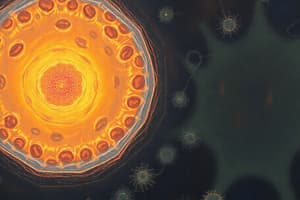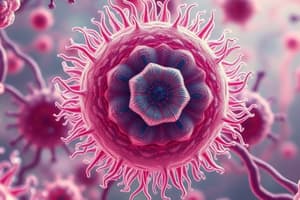Podcast
Questions and Answers
Ano ang tinutukoy ng mga organelo bilang?
Ano ang tinutukoy ng mga organelo bilang?
- Mga compartments sa loob ng selula na nagtatransporta ng materyales
- Mga compartments sa loob ng selula na nagdi-digest ng pagkain
- Mga compartments sa loob ng selula na may membrane at may espesipikong gampanin (correct)
- Mga compartments sa loob ng selula na nagpo-produce ng enerhiya
Ano ang proseso sa cell cycle kung saan ang kromosoma ng selula ay nagdudoble at humahati ito sa dalawang identical daughter cells?
Ano ang proseso sa cell cycle kung saan ang kromosoma ng selula ay nagdudoble at humahati ito sa dalawang identical daughter cells?
- Anabolism
- Interphase
- Metabolism
- Mitosis (correct)
Ano ang tinutukoy ng metabolism sa mga selula?
Ano ang tinutukoy ng metabolism sa mga selula?
- Paggamit ng nutrients at enerhiya ng mga selula (correct)
- Pag-aaral ng chemical reactions at processes sa loob ng selula
- Pagsira down sa molecules
- Paggawa ng mga molecules
Anong teknik ang ginagamit upang magkaroon ng three-dimensional images ng selula?
Anong teknik ang ginagamit upang magkaroon ng three-dimensional images ng selula?
Anong proseso ang tinutukoy sa pag-aaral ng chemical reactions at processes sa loob ng selula?
Anong proseso ang tinutukoy sa pag-aaral ng chemical reactions at processes sa loob ng selula?
Ano ang pangunahing layunin ng paggamit ng phase-contrast microscopy sa pag-aaral ng selula?
Ano ang pangunahing layunin ng paggamit ng phase-contrast microscopy sa pag-aaral ng selula?
Ano ang pangunahing pagkakaiba ng mga prokaryotikong selula at eukaryotikong selula?
Ano ang pangunahing pagkakaiba ng mga prokaryotikong selula at eukaryotikong selula?
Ano ang kahalagahan ng pag-unawa sa selula ng mga eukaryota?
Ano ang kahalagahan ng pag-unawa sa selula ng mga eukaryota?
Ano ang pangunahing papel ng nucleus sa eukaryotikong selula?
Ano ang pangunahing papel ng nucleus sa eukaryotikong selula?
Ano ang tinatawag na "cytoplasm" sa loob ng eukaryotikong selula?
Ano ang tinatawag na "cytoplasm" sa loob ng eukaryotikong selula?
Flashcards are hidden until you start studying
Study Notes
Cell Biology
Cell biology is a branch of biology that focuses on the structure, function, and behavior of cells, which are the fundamental unit of life. It encompasses both prokaryotic and eukaryotic cells and covers various aspects of cellular processes, including metabolism, communication, growth, and reproduction. Understanding cell biology is crucial for comprehending the basics of life, as well as the complex functions of various organisms.
Prokaryotic vs. Eukaryotic Cells
Prokaryotic cells, such as bacteria, lack a cell nucleus or any other membrane-bound organelles. These cells are typically smaller than eukaryotic cells and are the simplest form of life. On the other hand, eukaryotic cells are characterized by the presence of a nucleus and membrane-bound organelles, and they are found in plants, animals, fungi, and protists. Eukaryotic cells are significantly larger than prokaryotic cells, ranging from 10 to 100 micrometers in diameter.
Key Components of Eukaryotic Cells
Eukaryotic cells consist of several key components:
- Nucleus: Contains the cell's genetic material, which carries instructions for the cell's growth and function.
- Cytoplasm: The jelly-like substance surrounding the nucleus, containing various organelles and performing vital cellular functions.
- Organelles: Membrane-bound compartments within the cell that serve specific roles, such as producing energy (mitochondria), digesting food (endoplasmic reticulum), transporting materials (Golgi apparatus), and maintaining cell shape (cilia and flagella).
Cell Cycle and Division
The cell cycle refers to the stages of cell growth and division, resulting in the production of daughter cells. This process involves several phases, including interphase (growth and preparation for cell division) and mitosis (actual cell division). During mitosis, the cell's chromosomes are duplicated, and the cell splits into two identical daughter cells.
Biochemical Processes in Cells
Cells rely on various biochemical processes to carry out their functions, such as:
- Metabolism: The processing of nutrients and energy by cells, involving anabolism (building molecules) and catabolism (breaking down molecules).
- Biochemistry: The study of the chemical reactions and processes within cells, particularly involving macromolecules like proteins, carbohydrates, and nucleic acids.
Methods to Study Cells
To gain insights into cellular processes, researchers employ various techniques, including:
- Cell Culture: Growing cells outside of their natural environment in controlled conditions to study their behavior and response to external stimuli.
- Fluorescence Microscopy: Using fluorescent tags to visualize specific cellular components or processes.
- Phase-Contrast Microscopy: Analyzing cells using light to distinguish between solid, liquid, and gas-filled regions, revealing structural details.
- Confocal Microscopy: Capturing three-dimensional images of cells by combining fluorescence microscopy with focused light to create cross-section views.
- Transmission Electron Microscopy: Examining the ultrastructure of cells using high-powered electron microscopes to observe fine details.
In summary, cell biology is a critical discipline within biology that explores the structure, function, and behavior of cells. Through various techniques and approaches, researchers can understand the intricate workings of cells, leading to valuable insights into health, disease, and the broader implications of life itself.
Studying That Suits You
Use AI to generate personalized quizzes and flashcards to suit your learning preferences.




